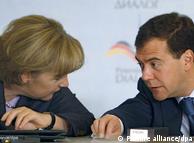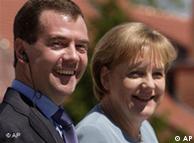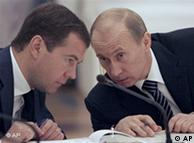RUSSIA | 18.07.2011
Merkel to meet Medvedev amid controversy over Putin prize
Politicians, business leaders and civil society experts from Germany and Russia are meeting in the northern city of Hanover to kick off a traditional public forum, intended to strengthen ties between the two nations.
On the sidelines of the event, German Chancellor Angela Merkel will host Russian President Dmitry Medvedev for a working dinner on Monday, followed by a meeting of most of their cabinets on Tuesday.
The talks come after a week of controversy in Germany following the announcement that a prominent political prize would go to Russian Prime Minister Vladimir Putin. Outraged critics said any award to Medvedev's predecessor would make a mockery of previous winners of the prize, who include several leading rights activists. Bowing to public pressure, organizers of the so-called Quadriga Prize called off the ceremony altogether.
The uproar over the prize, however, is unlikely to spoil Merkel's relations with Medvedev.
According to former minister of state in the German foreign office, Gernot Erler, Merkel was never a big fan of Putin. Her relationship with the prime minister has been strained, which some suggest is due to his KGB past, or her distaste for the political system in which he dominates.
 Merkel speaks Russian and Medvedev English, so the two do not need a translator
Merkel speaks Russian and Medvedev English, so the two do not need a translatorMerkel prefers Medvedev
Although Medvedev was Putin's protégé, the chancellor has always found him a better conversation partner. Medvedev's claims that he wants greater democracy and rule of law in Russia have been met with enthusiasm by Berlin.
"It is quite clear that the chancellor has a good understanding with Medvedev," Erler said.
In Yekaterinburg, where the summit took place in July 2010, the chancellor and president chatted after dinner until late at night.
The two got tongues wagging further with their informal references to each other by their first names in a press conference, and tête-à-tête conversations without a translator - Medvedev speaks English and Merkel speaks Russian.
The economic factor
Although both leaders have been recently preoccupied with domestic issues, the economy will be high on the agenda at the summit, according to Hans-Henning Schröder from the German Institute for International and Security Affairs.
Trade is currently booming, with about 6,000 German companies currently active in Russia. German exports rose in the first quarter of 2011 to 7.4 billion euros ($10.5 billion) - an increase of 42 percent. Imports from Russia rose by 9.5 billion euros.
Several top managers will be joining Merkel and Medvedev in Hanover.
Volkswagen CEO Martin Winterkorn will be at the summit to explore the opportunities available on the Russian market. The German car maker sold 45,000 cars in Russia in the first half of the year, doubling their sales, but the current VW plant in Kaluga, southwest of Moscow, will not be sufficient to meet the demand of Russian consumers. Volkswagen has struck a deal with the Russian manufacturer GAZ to produce 110,000 cars annually until 2019.
The Russian energy company Gazprom has seized the opportunity to expand by agreeing a strategic partnership with Germany's largest electric utility RWE. The two plan to cooperate on coal and gas-fired power plants both in Germany and internationally.
The partnership will please Medvedev, who was on Gazprom's board of directors for several years under Putin.
Unresolved issues
While issues of trade and energy show the close partnership between the two countries, some topics are not so cozy.
In Hanover, Merkel is hoping to push forward with a modernization partnership with Russia, particularly regarding legal issues.
European expert for the Free Democrats (FDP) in the Bundestag, Michael Link, said Russia still lacks the common values of human rights, media freedom and pluralism. Ex-Yukos boss Mikhail Khodorkovsky remains in detention under Medvedev, and the majority of murders of journalists and human rights activists remain unsolved. The president has done little or nothing to bolster and protect press freedom.
Regarding the rule of law, Medvedev has also been slow to act. His words have not been followed up with actions, says Link.
Merkel is fully aware of these shortcomings and always makes a point of meeting with human rights activists when she travels to Russia.
With presidential and parliamentary elections coming up in Russia in 2012, the hot topic is whether or not Medvedev will be running for re-election. The president has repeatedly dodged the question, as has his political ally, the prime minister and potential presidential candidate Vladimir Putin. The two have been close for two decades and it has been suggested Medvedev will step aside for Putin to run for a third term next year.
Author: Viacheslav Yurin / cb
Editor: Toma Tasovac
Editor: Toma Tasovac




No comments:
Post a Comment